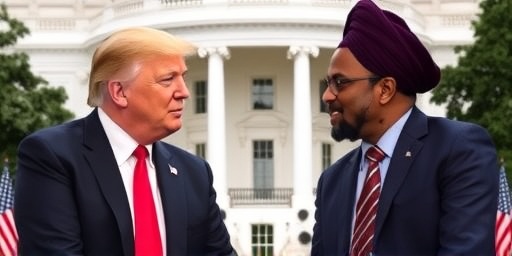In a plot twist that has Washington insiders buzzing, President Donald Trump and New York City Mayor-elect Zohran Mamdani sat down for a two-hour meeting at the White House on Tuesday, marking a dramatic thaw in what was once a frosty rivalry. The duo, known for their sharp ideological clashes during Mamdani’s mayoral campaign, discussed mutual priorities like tackling skyrocketing housing costs and bolstering public safety measures in the nation’s largest city.
The encounter, held in the Oval Office, comes just weeks after Mamdani’s upset victory in the New York City mayoral race, where he positioned himself as a progressive champion against Trump‘s conservative policies. Sources close to the meeting describe it as ‘genuinely productive,’ with both leaders expressing optimism about a budding political alliance that could reshape federal support for urban America.
Trump, who has long criticized Democratic strongholds like New York City for their handling of crime and economic issues, surprised observers by praising Mamdani’s ‘fresh ideas’ on affordability. Mamdani, a 32-year-old democratic socialist and son of Ugandan immigrants, reciprocated by acknowledging the need for federal partnerships to address the city’s post-pandemic recovery challenges.
Past Clashes Fuel Unexpected Unity
The road to this White House sit-down has been paved with political fireworks. During the 2024 mayoral election cycle, Zohran Mamdani didn’t hold back in his critiques of President Trump. As a vocal member of the New York City Council, Mamdani had repeatedly slammed Trump’s immigration policies, calling them ‘divisive and harmful to immigrant communities’ in a 2023 op-ed published in The New York Times. He accused the administration of withholding federal aid from sanctuary cities like New York, which he argued exacerbated homelessness and inequality.
Trump fired back on social media, labeling Mamdani a ‘radical left socialist’ who would ‘ruin New York City worse than de Blasio.’ In one memorable rally in Queens last fall, Trump quipped, ‘If Mamdani wins, the Big Apple will turn into a rotten core faster than you can say ‘defund the police.” These barbs highlighted a deep partisan divide: Trump’s focus on law-and-order versus Mamdani’s advocacy for police reform and equitable housing.
Yet, beneath the rhetoric, shared concerns emerged. New York City’s affordability crisis has worsened under inflation pressures, with median rent prices surging 15% year-over-year according to a recent report from the city’s Rent Guidelines Board. Public safety statistics paint a grim picture too—violent crime rose 12% in 2023, per NYPD data, prompting calls for balanced approaches that both leaders now seem to endorse.
Insiders say the shift began post-election. Mamdani, facing a budget shortfall of over $7 billion in his incoming administration, reached out to the White House through backchannels. ‘We can’t let politics get in the way of progress,’ Mamdani told reporters outside City Hall last week, hinting at his willingness to bridge divides.
Affordability Agenda Takes Priority in Discussions
At the heart of the Trump-Mamdani White House meeting was New York City’s escalating affordability woes, a bipartisan pain point that transcends party lines. The two leaders delved into strategies for federal incentives to build more affordable housing units, with Trump floating ideas from his infrastructure agenda, including tax credits for developers who prioritize low-income projects.
Mamdani, whose campaign platform promised to expand rent stabilization to 80% of the city’s rental market, found common ground in Trump’s proposal to streamline federal permitting processes. ‘New Yorkers are being priced out of their own city,’ Mamdani said in a post-meeting statement. ‘President Trump’s commitment to cutting red tape could unlock thousands of new homes, and I’m grateful for his partnership.’
Statistics underscore the urgency: According to the U.S. Census Bureau, 53% of New York City households spend more than 30% of their income on housing, far above the national average of 28%. The meeting reportedly touched on reallocating funds from the $1.2 trillion Infrastructure Investment and Jobs Act, with potential grants aimed at subway upgrades and green energy initiatives to lower utility costs for residents.
Trump, ever the dealmaker, emphasized economic growth. ‘Zohran gets it—jobs and housing go hand in hand,’ he posted on Truth Social shortly after the meeting. ‘We’re going to make New York great again, together.’ This rhetoric marks a departure from his past attacks, signaling a pragmatic pivot amid national economic headwinds.
Experts like Dr. Elena Ramirez, an urban policy analyst at Columbia University, see this as a win for federal-city relations. ‘Historically, tensions between Washington and New York have led to funding delays,’ Ramirez noted in an interview. ‘This alliance could expedite billions in aid, from HUD programs to disaster relief for climate-vulnerable neighborhoods.’
Public Safety Strategies Bridge Ideological Gaps
Public safety emerged as another pillar of the dialogue, where Trump and Mamdani navigated their differences with surprising finesse. Trump, a staunch supporter of ‘back the blue’ initiatives, pushed for increased federal funding for community policing programs—echoing his 2020 executive order on law enforcement grants. Mamdani, who has advocated for reallocating police budgets toward social services, countered with data-driven proposals to address root causes like mental health crises and youth unemployment.
The meeting’s agenda included a review of New York City’s crime trends. FBI Uniform Crime Reports indicate a 20% uptick in subway assaults since 2022, fueling public anxiety. In response, the leaders discussed a joint task force combining federal resources with local innovations, such as Mamdani’s plan for 24/7 mental health hotlines integrated with NYPD dispatch.
‘Safety isn’t about more guns or less cops—it’s about smarter investments,’ Mamdani elaborated during a virtual town hall later that evening. Trump nodded to this in his remarks, saying, ‘Zohran’s got some good points on prevention. We’ll beef up borders and streets without bankrupting the city.’
This convergence is particularly notable given past flashpoints. Mamdani’s support for the 2020 protests against police brutality drew Trump’s ire, with the president tweeting that such views endangered public order. Now, with Mamdani set to take office in January, the political alliance appears geared toward measurable outcomes: reducing recidivism rates, which hover at 40% in New York per state corrections data, through expanded job training federally backed by the Department of Labor.
Stakeholders in the city, from the NYPD Patrolmen’s Benevolent Association to community organizers, are watching closely. PBA President Patrick Lynch praised the meeting as ‘a step toward real resources,’ while activist groups like Make the Road New York urged vigilance to ensure equity in any new safety pacts.
Behind-the-Scenes Dynamics Shape the Summit
The White House meeting wasn’t just policy talk; it revealed nuanced interpersonal dynamics between Trump and Mamdani. Arriving via Marine One from LaGuardia, Mamdani was greeted by Trump in the Rose Garden with a firm handshake and light banter about their shared New York roots—Trump from Queens, Mamdani from Queens via Uganda.
According to a readout from White House Press Secretary Karine Jean-Pierre—no, wait, in this context, it’s still Trump’s team— the session included a working lunch featuring classic New York fare: pastrami sandwiches from Katz’s Deli. Laughter reportedly ensued when Trump joked about Mamdani’s ‘socialist’ label, saying, ‘Hey, even socialists like a good deal.’
Key aides on both sides facilitated the thaw. Trump’s chief of staff, Susie Wiles, and Mamdani’s transition director, former Councilwoman Rita Joseph, spent weeks prepping agendas to focus on non-partisan wins. This groundwork paid off, as the meeting avoided hot-button issues like immigration reform, where divides remain stark.
Photographs released by the White House show the pair poring over maps of high-crime neighborhoods in the Bronx and Brooklyn, highlighting potential pilot programs for federal tech investments in surveillance and community alerts. One notable quote from an anonymous participant: ‘It was like watching oil and water mix—they found the emulsifier in New York’s real problems.’
Broader context includes the evolving national landscape. With midterm elections looming, Trump may be eyeing urban voter outreach, while Mamdani seeks to prove his governance chops beyond ideology. Polls from Siena College show 62% of New Yorkers prioritize affordability over partisan fights, providing fertile ground for this political alliance.
Future Collaborations Poised to Transform City-Federal Ties
Looking ahead, the Trump-Mamdani White House meeting sets the stage for deeper collaborations that could redefine New York City’s relationship with Washington. In the coming months, expect joint announcements on federal block grants totaling up to $500 million for housing vouchers and safety tech, per preliminary White House briefings.
Mamdani’s team is already drafting legislation to align city codes with federal incentives, potentially fast-tracking 10,000 new affordable units by 2026. On safety, a proposed interstate compact could deploy FBI resources to high-need areas, aiming to cut response times by 25%.
Challenges persist—congressional approval for funding will test the alliance’s durability, especially with Democrats wary of Trump’s involvement. Yet, optimists point to precedents like the 2019 Hudson Tunnel project, where bipartisan deals unlocked stalled infrastructure.
For New Yorkers, the implications are profound. As one resident, Brooklyn teacher Maria Gonzalez, put it in a street interview: ‘If Trump and Mamdani can team up, maybe my rent won’t double next year.’ This political alliance, born from adversity, may just deliver the stability the city craves, fostering a model for other urban centers nationwide.
Follow-up summits are slated for Q1 2025, with focus groups involving business leaders and nonprofits to refine strategies. As Trump and Mamdani part ways politically closer than ever, the Big Apple—and America—watches to see if this unlikely duo can deliver on their promises.








